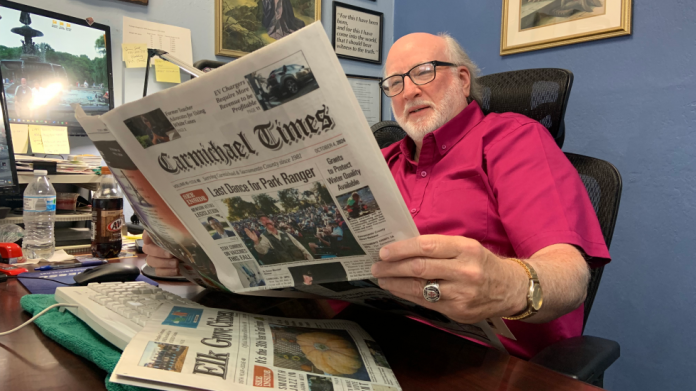The walls of Paul Scholl’s office in Carmichael are filled with
print replicas of classic art, three portraits of Jesus Christ
and a Bible quote. But behind his desk hangs a mounted dagger
with a feather attached. “The pen is mightier than the sword,”
explains Scholl. As a career newsman and ordained minister, he
understands the power of the written word. It’s made him
successful in business.
Scholl started a newspaper close to 18 years ago and bought
others as the owners looked to retire or struggled financially.
Today, his company Messenger Publishing Group
publishes 18 papers (11 weeklies, five bi-weeklies and two
monthly) covering 13 cities across six Capital Region counties.
The group he built has a total monthly print circulation of
230,000. And he’s looking to buy more.
Scholl continues to purchase papers while print advertising
revenue and circulation numbers decline industry-wide, according
to the
Pew Research Center. A report from the
Medill School of
Journalism showed 3,200 print newspapers in the U.S.
ceased since around the time Scholl started publishing. Newspaper
owners are struggling, but not Scholl.
“We had our biggest month ever last month. We’re gaining steam,”
he says. He attributes this to his expansion across the Capital
Region through acquisition. Scholl has enough papers to drown
Sacramento and its surrounding suburbs in ink, and that’s
appealing to advertisers. Plus a physical publication has
qualities that websites can’t replicate.
“There’s an integrity that goes with the printed local
newspaper,” Scholl says. “For us, being in print and online,
we’re getting all the advertisers first, because they know print
is still king.”
Starting a news blog? “I’m sorry, that’s child play,” Scholl
says. Starting a print newspaper? “It would be extremely
difficult.” He wouldn’t recommend it to any with at least some
background in the industry. Even Scholl has had to shutter papers
he’s created, like the North County Messenger and the West
Sacramento Sun. However, he has used his decades of experience to
devise a system for growth through buying and developing legacy
outlets.
Previously, Scholl worked in several management jobs at different
newspaper companies, handling marketing and circulation. After 25
years, he decided to launch a paper of his own. In 2006, Scholl
started the American River Messenger out of his home garage. Part
of the motivation was to promote his services as a hospice
chaplain, but the news operation soon took priority.
Scholl said he was greatly influenced by the three years he spent
at Alameda Newspaper Group, a subsidiary of MediaNews Group.
While there, he was part of a team that researched different
scenarios where they took ownership of nearby papers and the
steps to take after completing the sale. “It was quite the
growing experience, and I don’t think I would have been able to
pull all of this off if I hadn’t had that kind of training.”
The strategy Scholl developed involves being proactive. He keeps
tabs on nearby papers in the event they go for sale. Sometimes he
swoops in to rescue a paper after it has closed. The owners of
the Gridley Herald gave staff one day’s notice before printing
its final issue only for Scholl to revive it a week later, the
Chico
Enterprise-Record reported. On the front cover read
“The Herald Living to See Another Day.”
Another time, Scholl stuck his business card and a note in the
door of the Rancho Cordova Grapevine-Independent’s officeafter it
abruptly ceased. A few days later Scholl and the owner shook
hands and he took over operations. “Was it the best thing we ever
put out? No, but we printed that week and then we grew it from
there.” Scholl moves fast after landing a sale. He can
incorporate a newspaper into his business within three days. This
speed ensures readers never miss an edition. There is a year of
“growing pains” to work out advertising, billing and staffing.
“Then by the second year, I’m out there shaking hands and kissing
babies.”
Paul Scholl publishes 18 print newspapers in the Sacramento area,
and he’s open to buying more.
Without Scholl intervening in these papers, he says “every single
one of them would have closed. So not only would you have a news
desert in a couple of communities, you would have a news desert
in Sacramento County.” But were any of them profitable at the
time of purchase? “Well, if they were profitable, they wouldn’t
sell them,” he says. So Scholl buys failing newspapers and makes
them financially sustainable. He does this by cutting costs.
Production is streamlined and standardized, making it easier for
customers to buy ads across multiple papers. It’s a successful
formula others in the industry have noticed.
“This is a very cutthroat business, and Paul is a survivor,” says
Susan Laird, a journalist who’s worked in the Sacramento area for
decades. For a few years, she was the editor at Valley Community
Newspapers, at one time Scholl’s competitor. “He’s assembled a
little geographical publishing empire, and because he’s doing it
through efficiency, he’s an innovator in that sense.”
Laird describes Scholl as “a Christian gentleman” and “an angel
for our industry.” She said he’s “an old-school newspaper guy but
without the staff” because of how few newsroom workers he
employs. Messenger Publishing Group has 24 employees, but only
three full-time reporters. Editors also contribute copy when not
managing the 20 or so freelance writers. Decades ago these
community newspapers that covered a city neighborhood or rural
town had an editor, a couple of reporters and a photographer. As
revenue declined industry-wide, hyper-local publications shifted
to relying on freelancers who often are more akin to paid
volunteers due to how little they’re compensated. “You can’t live
on a freelance salary in the community newspaper business,” Laird
says. When not using paid contributors, Scholl utilizes a
costless means of filling pages that some in the journalism
industry scrutinize.
Four years ago, two newspapers briefly went to war in Contra
Costa County. The announced closure of a 161-year-old newspaper
in Martinez made headlines around the Bay
Area. A scramble ensued to save it, but the owners never returned
any calls, according to three sources. This set the stage for
what happened next. After failing to buy the paper, Scholl
launched the Martinez News Messenger, a bi-weekly free paper
mailed to households in the city.
Then there was Rick Jones, editor of the defunct Martinez
News-Gazette, who relaunched the paper as a weekly
subscription-only publication. The two papers went head-to-head.
Despite similar names and pulling from the same pool of local
freelancers, the two differed in content strategy. Jones focused
more on hard-news topics like local government, crime, industry
and national stories. No big exposé pieces, but “the news of the
day,” Jones says.
Scholl’s papers tend to have more positive news with feel-good
stories centered around community events, schools and nonprofits.
He also republishes news releases which he gets for free. These
are articles an organization writes to inform the public of
something they feel is noteworthy. Often they’re self-promoting
in nature and highlight the successes of a politician, government
agency or business rather than news relevant to the general
public. It is information from an official source. However, the
story can be incomplete without journalists working to verify
that information, add context and challenge narratives.
“It’s hard to weigh what value, I mean, in this day and age,
somebody that’s putting out a weekly or monthly deserves credit,
in my mind, for sure,” Jones says of Scholl’s papers. “What news
value it has, I guess, is in the eye of the reader, so to speak.”
In the end, the war had no winner. The COVID-19 pandemic ensued
in early 2020 and both Martinez papers ceased after about two
months of operation. But Scholl went on to grow his enterprise.
He bought a dozen newspapers in four years. The East Sacramento
News was one of them. Lance Armstrong was the last editor to work
at the paper before Scholl bought it. He said it was noticeable
how the paper began republishing news releases after the change
of ownership. Times are tough in the industry, and he can see why
someone would use free content. Last year the paper’s previous
owners shut down its Galt press facility. It was the last
newspaper company-owned printing press in Sacramento County.
“In today’s challenging world of print journalism, in which
newspapers continue to battle for their
survivals, change is inevitable,” Armstrong wrote in an email.
“While I prefer newspapers that are heavy on original content
written for the papers in which they appear, I also understand
the significant budgetary constraints that many newspapers are
facing today.”
Scholl says many news releases are written by “yesterday’s
reporters,” former journalists who went on to work in public
relations as the industry contracted. These articles are written
by people with reporting experience using accurate information
“you really should have.” What Scholl does is collect it from
various websites and puts it in one place, reaching people
through print who otherwise might have missed it. “We’re
basically performing a service aggregating all of this news.”
And service is important to Scholl, who sees Messenger Publishing
Group “more as a mission or ministry, as opposed to a business.”
It’s a view informed by his faith background. He was a church
pastor for about a year and has officiated hundreds of weddings.
There was a time when he brought his Bible to the corporate
boardroom. Scholl is also well known for his involvement in the
area’s various chambers of commerce. He always says hello to
folks at meetings and has endeared himself so much to local
stakeholders that two years ago the Carmichael chamber named him
“Businessman
of the Year.”
“He certainly has his foot in all these communities,” says Jim
McCormick, president and CEO of the Sacramento Choral Society &
Orchestra. Scholl “gives nonprofits a good break” by offering
discounts and complimentary ads. One time he surprised McCormick
with a full-page ad when he only paid for a quarter. “He goes
beyond the call of duty. He’ll even come to our concerts.”
Scholl plans to continue serving the community and growing his
company. Some day he’d like to pass the business on to a new
owner. Until then, he will run it under ideals he says are summed
up by John 18:37, the Bible passage on his office wall: “For this
I have been born, and for this I have come into the world, that I
should bear witness to the truth.”
Correction Nov. 15 2024: A previous version of this article
mistakenly referred to Messenger Publishing Group as Messenger
Media Group.
–
Subscribe to the
Comstock’s newsletter today.








